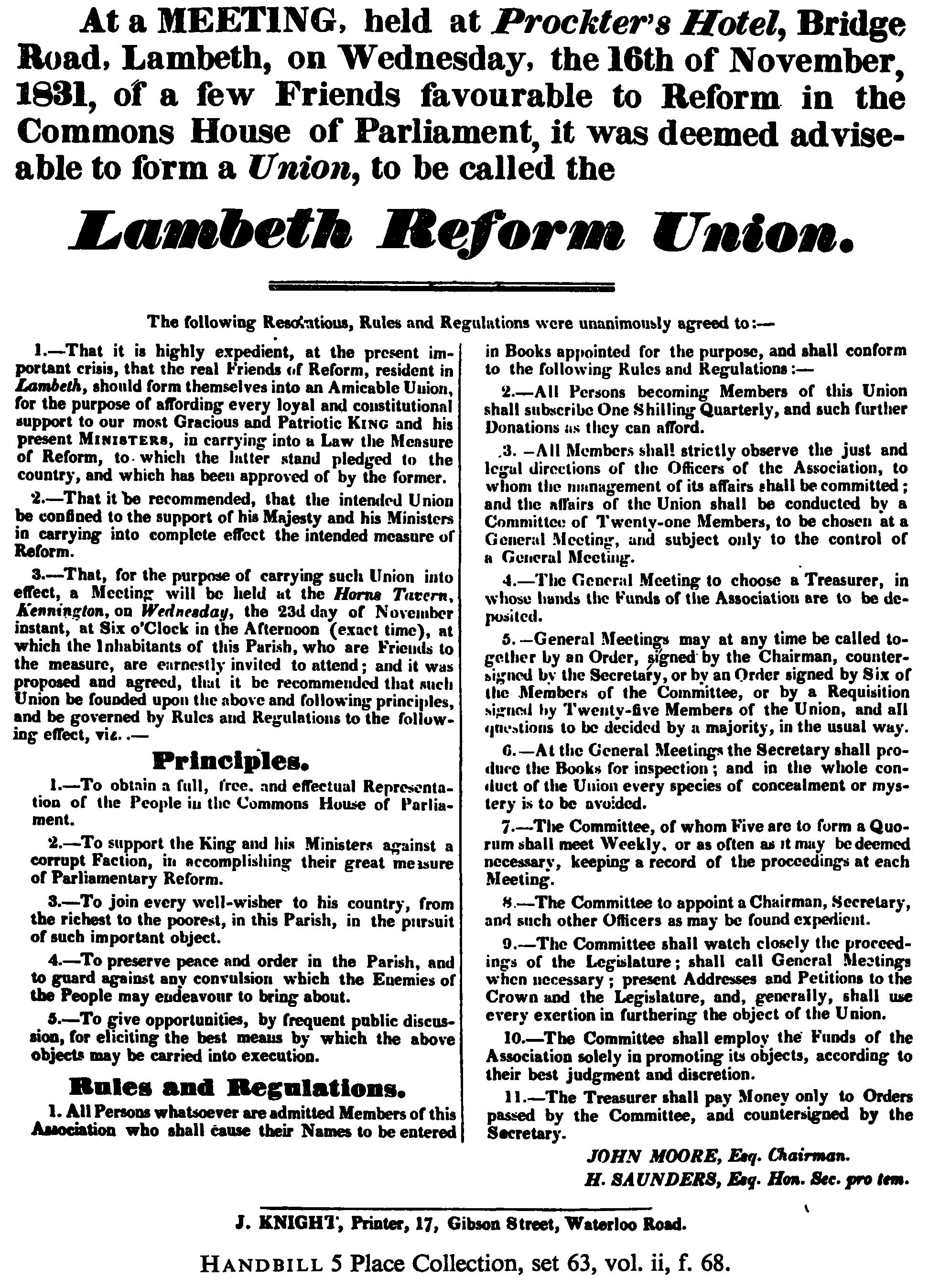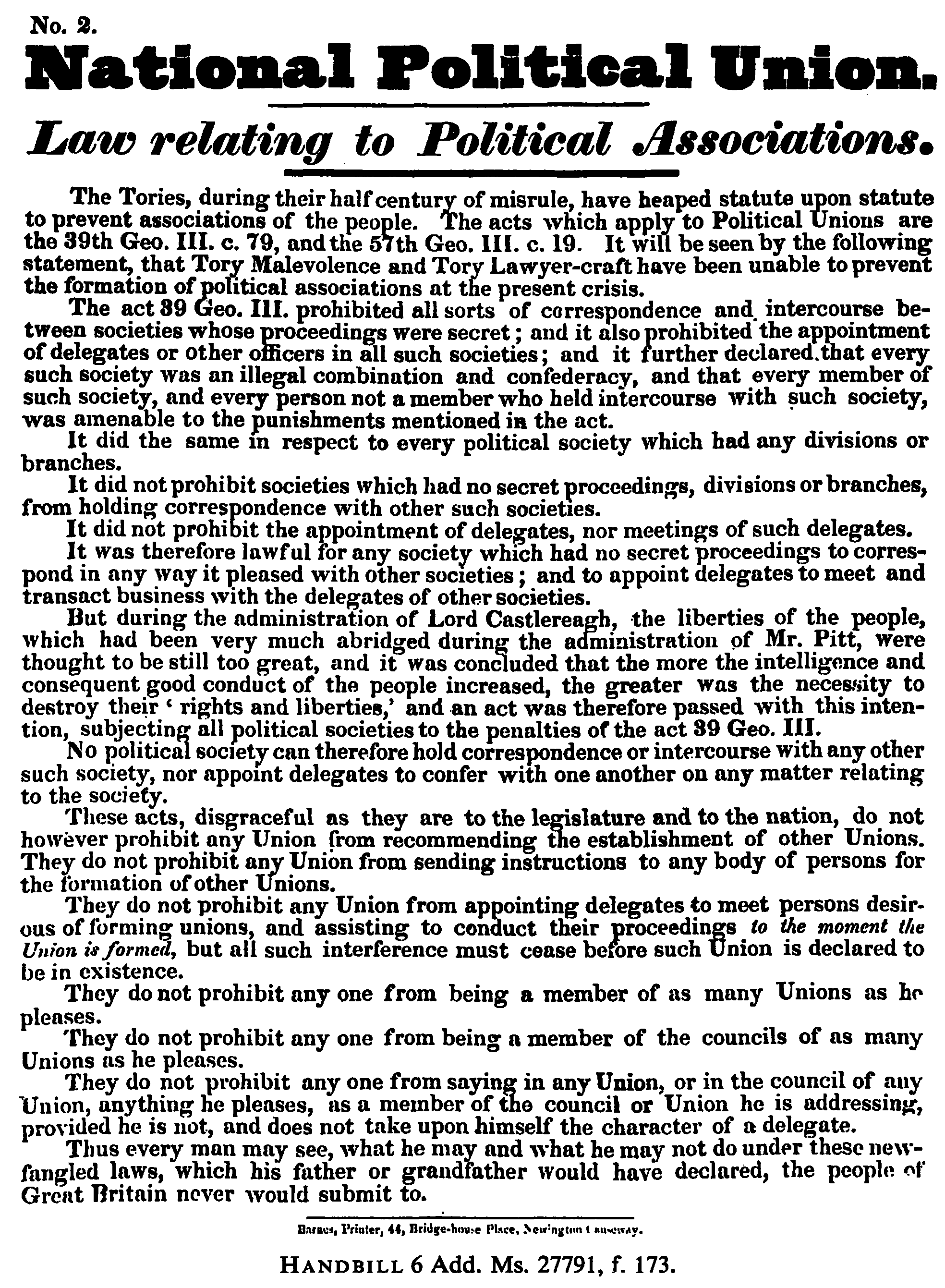London Radicalism 1830-1843: A Selection of the Papers of Francis Place. Originally published by London Record Society, London, 1970.
This free content was digitised by double rekeying. All rights reserved.
'Papers relating to the National Political Union: (2 of 2)', in London Radicalism 1830-1843: A Selection of the Papers of Francis Place, ed. D J Rowe (London, 1970), British History Online https://prod.british-history.ac.uk/london-record-soc/vol5/pp64-72 [accessed 29 April 2025].
'Papers relating to the National Political Union: (2 of 2)', in London Radicalism 1830-1843: A Selection of the Papers of Francis Place. Edited by D J Rowe (London, 1970), British History Online, accessed April 29, 2025, https://prod.british-history.ac.uk/london-record-soc/vol5/pp64-72.
"Papers relating to the National Political Union: (2 of 2)". London Radicalism 1830-1843: A Selection of the Papers of Francis Place. Ed. D J Rowe (London, 1970), British History Online. Web. 29 April 2025. https://prod.british-history.ac.uk/london-record-soc/vol5/pp64-72.
Papers relating to the National Political Union
31. [Add. Ms. 27791, ff. 94-5]
At a meeting held at Benbows house in the evening of the 9th November (This was a meeting of the committee of the Union of the Working Classes), the Commercial Coffee House, Fleet Street. A Mr Petrie one of the active Rotunda leaders, proposed a plan to drill the people in some way of his own so as to make them equal if not superior to the best disciplined troops. This motion was discountenanced by the Chairman Wm Lovett and was dropped.
Benbow moved. 'That the Whig Union of which Sir F. Burdett was at the head, was a jesuistical attempt of the committee of the National Union to cajole the working classes to employ their moral and physical force in support of the whig reform bill, and that no union deserved or ought to receive the support of the working people which did [not?] declare its purpose to be the obtainment of Annual Parliaments and Universal Suffrage.'
The Morning Chronicle which contains an account of this meeting reports.
That the chairman joined with Mr Watkins Mr Cleave and others in deprecating the introduction of the resolution on the ground that the union at the Crown and Anchor had not yet assumed any character and that it could not be known what its principles were to be until its rules and regulations were drawn up and agreed to at a public meeting of the members. It could not be said that the gentlemen had determined what the character of the union should be as they had left it to a general meeting of the members to be held tomorrow evening, (Thursday) to appoint a committee which should within a month from that day propose to another public meeting rules and regulations for the government of the Union. It was also to be borne in mind that there were to be 36 working men upon the committee, and the members of the Union of the working classes ought to go to the meeting tomorrow night and support the appointment of such men as would make the principles of the National Union their principles and its objects their objects (hear hear).

Handbill 5
Major Beauclerk and other gentlemen had already declared that they would not accept the Whig Bill as a final measure (hear) and it was on that account that Mr Barber Beaumont and others were attempting to get up unions pledged to ask nothing beyond the bill for the purpose of cutting up the National Union.
Benbow withdrew his motion with the intention of submitting it to the next meeting of delegates.
32. [Add. Ms. 27790, ff. 242-3]
. . . [There] was issued another proclamation against 'Political Unions composed of separate bodies with various divisions and subdivisions under leaders with a gradation of ranks and authority,' etc. it then alludes specifically to the plan of the Birmingham Union in assuming to constitute themselves a municipal corporation,—and declares all such illegal.
Advantage was taken of this proclamation by the Tory papers to alarm the members of the various unions, some of which but not in considerable numbers abstained from attending the meetings, others were intimidated and prevented becoming members, and two or three unions consisting of very few persons dessolved [sic] their association and dispersed, among these was a very paltry one which had assumed the title of the Westminster Union, and was to consist of none but respectable persons. The National Political Union had previously published an abstract of the laws relating to political associations, (fn. 1) it was printed as a hand bill sent to every union known to the National Union, and freely dispersed in every direction. In the evening of the 22nd, four members of the Council of the Union having met together caused the following advertisement to be inserted in most of the London daily papers.
National Political Union Royal Proclamation
To the editor etc.
Sir in consequence of the mis-statements of some of the evening newspapers upon the subject of the Proclamation relating to Political Unions, and the strong excitement it has occasioned. We as members of the Council think it necessary to state that the Proclamation does not apply to the National Political Union nor to the great majority of the Unions now in existence. The Proclamation is in fact, little more than a copy of the 'Laws relating to Political Associations'—put forth some days ago by this Union and now in the hands of the members.

Handbill 6
33. [Add. Ms. 27791, f. 184. Council as at general meeting on 1 December 1831. Printed.]
34. [Add. Ms. 27791, f. 222. Printed balloting list for the council of the National Political Union, February 1832, with figures added in manuscript.]
1st of the working class
2nd not of the working class
N.B. Members must strike out the names of those they do not intend to vote for. No more than 36 names must be left on each of the above lists: it may contain any smaller number.
[In the Place Collection, set 17, vol. 2, there are two balloting lists, annotated in Place's writing, 'List made by one and agreed to by several in the hope of excluding the dishonest men who would destroy the Union—viz Augero, Grady, Lovett, Cleave, Dias Santos, Fall, Hunt.' and 'Rotunda list made by Dias Santos, Grady and Fall'. In the above list those whose names were struck off the list by the Rotunda men are marked *, and those whose names were struck off by Place and his friends were marked †. Those unmarked were, presumably, acceptable to both groups. Columns A and B, respectively, show the positions, according to votes received, of those elected and those not elected.]
35. [Add. Ms. 27791, f. 147]
Balloting for the Council in the way it was done was under the circumstances of the case the best mode of election that could be devised. It was however a very defective mode, every member was required to select seventy two other members, to whom he would be willing if not as he ought to have been desirous to chuse to manage for him, this was absurd, not one man in the whole union could pick out seventy two such men, no man in the union could have the knowledge of seventy two men each of whom was at all qualified for the office he was to fill. The consequences were that many voted simply on the direction of others, those others themselves chusing by far the greater part of the persons to be voted for at random. Many voted only for a small number, and some confined themselves to the very few with whom they were acquainted. A very large number did not vote at all, because there were not more than from one to perhaps two with whom they were sufficiently acquainted to be able to decide as to their fitness. To be complete each member should have had but one vote for one candidate only. As it was, it was a good lesson to a large number of persons, in as much as it shewed them with what ease, certainty and precision and in how short a time the secret suffrages of a very large number of persons could be taken.